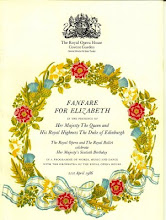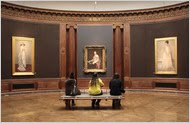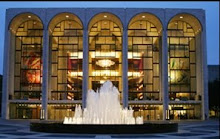Paris--April 2016
Philharmonie de Paris located in the 19ème
Inside the Grande Salle--Philharmonie de Paris
Monday, April 11--Philharmonie de Paris
Hélène Grimaud
Only a few days before I was to leave for Paris a single ticket became available for a performance by Hélène Grimaud. I had only seconds to make the purchase. It is highly unusual for me to attend a performance on the day of arrival after an overnight flight. Little did I realize that I was going to have the experience of a life time:
Orchestra dell'Accademia Nazionale di Santa Cecilia
Sir Antonio Pappano, direction
Hélène Grimaud, piano
Giacchino Rossini
Ouverture de La Cenerentola
Ludwig van Beethoven
Concerto pour piano No. 4
Entracte
Camille Saint-Saëns
Symphonie No. 3 Avec orgue [with organ]
Daniele Rossi, organ
Tuesday, April 12--Philharmonie de Paris
London Symphony Orchestra
Sir Simon Rattle, direction
Pierre-Laurent Aimard, piano
Olivier Messiaen
Couleurs de la Cité céleste
Entracte
Anton Bruckner
Symphonie No. 8
Wednesday, April 13--Opéra Bastille
Roméo et Juliette (Ballet de L'Opéra) after Shakespeare's play
Music--Sergei Prokofiev
Choreography--Rudolf Noureev
Ballet created for the Paris Opera Ballet, first performed October 19, 1984
In 1977 Rudolf Nureyev created a new version of Romeo and Juliet for the London Festival Ballet, today's English National Ballet. He performed the lead role of Romeo, with British ballerina Patricia Ruanne creating the role of Juliet. As a partnership, they toured the production internationally. It continues to be a popular ballet in the English National Ballet repertoire.
Orchestra de l'Opéra national de Paris
Simon Hewett--Direction Musicale/Conductor
Roméo Mathias Heymann
Juliette Léonore Baulac
William Shakespeare's most performed play, along with Hamlet, was not adapted until the 20th century into a ballet. Sergei Prokofiev first had the idea of composing a score which was choreographed by Leonid Lavrosky in 1935. His magnificent Romeo & Juliette would go on to inspire numerous other versions, including that of Kenneth MacMillan, first performed in 1965 with Rudolf Nureyev and Margot Fonteyn in the leading roles.
Rudolf Nureyev's version was added to the Paris Opera Ballet repertoire in 1984. His version uses much of the ballet he had premiered in London in 1977. He scrupulously followed Sergei Prokofiev's score, which is faithful to Shakespeare's play, expanding the role of Romeo, whom he described as a "young boy who becomes a man", opposite a passionate Juliette, who also finds herself tragically entering adulthood.
With Ezio Frigerio's sumptuous Italian-Renaissance-inspired sets and costumes, Nureyev succeeded in recreating the sophistication and sensuousness of the Elizabethan drama, but also all its cruelty.
Place de Bastille
Friday, April 15--Théâtre des Champs-Elysées
Philharmonia Orchestra
Vladimir Ashkenazy---direction
Boris Berezvsky---piano
All Rachmaninov program
Vocalise op. 34
Piano Concerto No. 1 pour piano et orchestre en fa dièse (F sharp) mineur
Entracte
Symphony No. 2 en mí (E) mineur op. 27
In this very concert hall in the autumn of 2010, the Philharmonia and Vladimir Ashkenazy performed a Rachmaninov cycle over three evenings, offering a thoughtful selection of works retracing the career of this composer who was the heir to the great tradition of the Russian school but also a visionary of the nascent musical forms of the 20th century. As a young man, pianist Vladimir Ashkenazy spent a long time exploring the twists and turns of this protean body of work. Now as a conductor, he continues to devote himself to Rachmaninov in the concert hall and on CD.
Ashkenazy has produced a wonderful recording of the complete Rachmaninov symphonies and piano concerti with the Concertgebouw. [I could not find these recordings on youtube.]
Vladimir Ashkenazy performs Rachmaninov Piano Concerto No. 1--London Symphony Orchestra, André Previn, conductor
0
I was surprised to see a gigantic Ferris wheel in the Place de la Concorde. The French call it Le Grand Rue.










































No comments:
Post a Comment